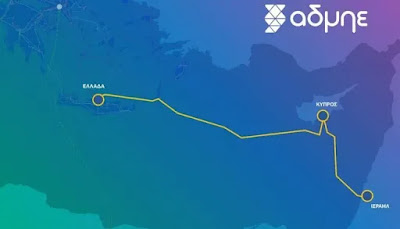Filenews 17 June 2025
With a critical milestone next August, the project of the electricity interconnection between Crete and Cyprus is now underway, as Nexans – contractor of the project – has announced that it will continue the construction until then.
What will happen next, no one can predict with IPTO being called upon to untie the Gordian knot and exerting pressure for the immediate recovery of costs from the two regulatory authorities of Greece and Cyprus, in order to ensure the liquidity of the project.
Competent sources of RAAEY explain that, in order to approve the permissible revenue of €7.5 million. For the cable, IPTO had to submit data on operating expenses (opex) and other related projects, something that happened at the end of last week.
The goal now is for the relevant decisions to be taken in next Thursday's Plenary, so that the recovery of expenses can begin through the electricity bills of Greek consumers from July.
However, there is no optimism on the part of the Cypriot side, which appears reluctant to approve the collection of revenues, maintaining reservations as to the outcome of the electricity interconnection project. As competent government officials say, you cannot finance a project that you do not know if and when it will be done.
Support at the European level
The Greek government continues to speak vaguely about the implementation of the project, but took a step yesterday in Luxembourg at the Council of Energy Ministers. Following coordinated actions, it succeeded in including an explicit reference in the conclusions of the EU Council of Ministers on the need to protect Projects of Common Interest (PCI) – such as cross-border subsea cables – from interventions and obstacles by third countries.
This development acquires particular importance, in view of the Turkish objections that have already caused a delay of more than a year in the Crete-Cyprus project. The same conclusions also stress the need to accelerate the deployment of strategic cross-border infrastructure, as a means of strengthening the European Union's energy security and resilience.
Papanastasiou's visit to Athens
While Cyprus does not stop keeping its distance from the project, today the Minister of Energy, George Papanastasiou, is visiting Athens to speak at an energy conference of the newspaper "Kathimerini" and the Financial Times. His presence coincides with the intensifying pressure to clarify Nicosia's positions.
The Cypriot government, as reported, is deeply concerned about whether it is prudent for IPTO to proceed with such a large loan, without being sure that it will be able to complete the project – in view of geopolitical uncertainties.
In a recent interview with Bloomberg, IPTO's chairman and CEO, Manos Manousakis, mentioned IPTO's difficulty in securing financing from banking institutions, at a time when lenders are asking for documents showing that there is a revenue recovery.
As he noted, in order for the project to move forward, it is necessary to have an active flow of payments from the regulatory authorities. Otherwise, funding is practically impossible and the project is in danger of being frozen.
Already, as IPTO has stated, it has invested about €250 million, an amount for which, however, the origin of the funds is not clarified. That is, if they concern own funds or European funding or a combination, given that the project is partially covered by resources of €658 million? The remainder can be gradually recovered by regulators.
It is clear, however, that the Operator has to deal with a difficult situation for the cable, as if the project is wrecked, then it will be forced to return all European funding.
Different payment rates CERA has committed to cover a total of €125 million. By paying €25 million a year from 2026 onwards, while the remaining amount (until full coverage) will be paid gradually, if and when the interconnection is put into operation.
On the contrary, RAAEY has committed to approve the recovery of all justified costs of the project during the implementation phase, passing on the costs to Greek consumers through electricity bills, something it states it is willing to do immediately.
So far, the only positive signal for the progress of the project is the recent statements of the French company Nexans, the contractor of the cable. Its management assured that the works will continue until August 2025, implying that by then payments from IPTO have been secured. Executives of the Operator point out that about 200 kilometers of cable have already been constructed, but if the funding stops, the works will also be interrupted.
insider / newmoney.gr
